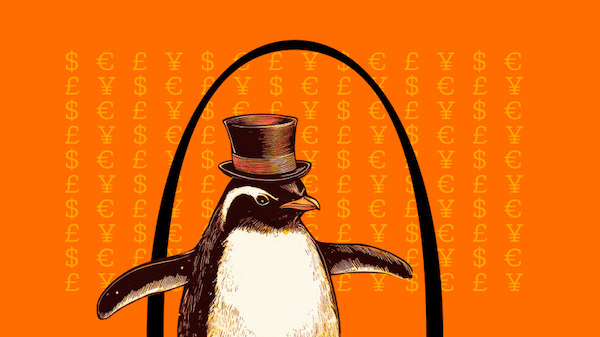In 2003 I bought a t-shirt that on the front said “Fuck Bush” in a surprisingly cheery font and on the back had a two-column list of twenty-four corporations: “Fuck Exxon-Mobil, Fuck Coca-Cola, Fuck Starbucks …” When I wore it to protests no one ever stopped me to ask me why Nike or Disney were on the list. After all, the Left is usually very good at analyzing and critiquing capital, showing us where the money is and what it means for massive corporations to wield extraordinary power. From Big Pharma to Big Energy, Big Retail, Big Agriculture, and Big Media, both academics and activists can usually name the largest of our corporate enemies in each industry and at least two or three of their corporate crimes.
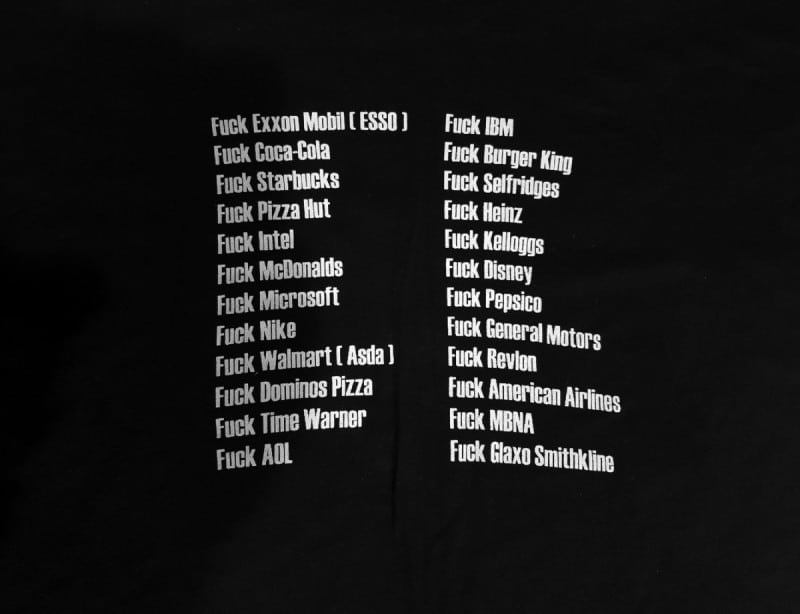
Back of “Fuck Bush” t-shirt.
But the usual list of the Left’s corporate enemies, just like the list that was on my t-shirt, never includes multinational book publishing corporations. Lefties generally give Big Book a free pass. As politically savvy consumers grapple with overlapping calls for boycotts and buycotts, it seems like a good time to talk about this blind spot.
The Big Five
When we talk about Big Book we’re mostly talking about the “Big Five.” These are the top five trade publishers in the world. (“Trade,” in the publishing industry, means not educational or academic publishing but books aimed at the general reader.)
The “Big Five” publishing houses—Macmillan, Simon & Schuster, Hachette, HarperCollins, and Penguin Random House—wield enormous global power. These multinational corporations control about 80 percent of the English-language trade publishing market. As Vox reported in 2022, “The big publishers are now so big, with such extensive backlists and such deep pockets, that it’s nearly impossible to compete with them at scale.” In the US, Big Five—published books make up more than 80 percent of the titles on bestsellers lists. They dominate the book market in the UK, Canada, and Australia. The top four of the Big Five also publish in more than 15 additional languages and sell licensing rights in every other language. In most languages, translations from English make up a surprising number of newly published books and these translations are most likely to have originated at one of the Big Five publishers.
The academic and educational versions of Big Book—Pearson, Thomson-Reuters, Wiley, McGraw-Hill, Oxford UP, and others—make huge profits from exercising far too much control of academic and textbook publishing. These companies, along with their much smaller scholarly counterparts, shape what students read and discuss and determine which academic work gets a big audience and which academic work ends up padding the back of the catalogue. No one should downplay the importance of corporate and neoliberal influences on educational and academic publishing, but here I’ll focus on non-fiction trade publishing, where ideas from both within and beyond academia are sold to the broadest and largest readership.
As the second-largest publisher in the world, with operations in fifteen countries and more than 120 publishing imprints, HarperCollins had sales of US$2.09 billion in 2023. The “About Us” page of the HarperCollins website points out to potential readers that HarperCollins is the house of “Mark Twain, the Brontë sisters, J. R. R. Tolkien, Zora Neale Hurston, Martin Luther King Jr., Gabriel García Márquez, George R. R. Martin, C. S. Lewis, Maurice Sendak, Margaret Wise Brown, and many more.” It fails to mention that HarperCollins is also a subsidiary of Rupert Murdoch’s News Corp.
Penguin Random House (PRH, formed when Penguin and Random House merged in 2013) is the biggest of the Big Five, with “operations in more than 20 countries across six continents” and more than 300 imprints and brands. Last year, PRH reported sales of US$2.53 billion in the first half of 2024, up 8.5 percent from the same period the previous year, selling “nearly 35 million more books.” This success was attributed in part to audiobook sales and the January acquisition of Hay House, which added €35 million to PRH revenue.
We should of course be concerned about the concentrated control of any industry, but it’s especially concerning to see just five corporations control an industry that has so much power over knowledge production and culture. This was the reasoning behind a US federal judge’s decision to block PRH’s attempt to purchase Simon & Schuster in 2022. The decision, he said,
protects vital competition for books and is a victory for authors, readers, and the free exchange of ideas.…The proposed merger would have reduced competition, decreased author compensation, diminished the breadth, depth, and diversity of our stories and ideas, and ultimately impoverished our democracy.
But a closer look at the Big Five shows that it’s more than just market dominance we need to worry about.
Publishing in support of the far right: the past
PRH is wholly owned by German multinational Bertelsmann—one of the world’s largest media companies. In 2002 Bertelsmann was forced to acknowledge its conduct during the Nazi era and its later attempts to cover up the truth: the Bertelsmann family patriarch, Heinrich Mohn, “had belonged to a circle of supporters who had donated money to the SS.” Furthermore, “far from resisting the Nazis, as it once claimed, Bertelsmann used its ties with the regime to transform itself from a provincial Lutheran printing company into a mass-market publisher.” Mohn produced cheap, popular war adventure books and “Bertelsmann Volksausgaben” or “people’s editions,” mostly read by Nazi soldiers, and turned the company into a National Socialist model enterprise. It became “the largest supplier of books to the German Army.” Bertelsmann’s books were “replete with anti-Semitic themes,” including Bertelsmann’s religious literature, “which began to use Nazi terminology.” An independent commission found that “Bertelsmann had probably also profited from Jewish slave labor at a handful of printing plants in Lithuania where it contracted work.” Bertelsmann’s revenues skyrocketed during the war, but the company was closed by Nazi officials in 1944 when they were suspected of illegally hoarding stockpiles of paper.
After the war, Bertelsmann portrayed itself to the Allies as a Christian publisher that had been part of the resistance to the Nazis, claiming they had been shut down because of their anti-Nazi stance and subversive publications. In 1945, Mohn was able to obtain a license to resume publishing from the British occupying force by maintaining that he had been a victim of the Nazis. This fiction was actively promoted by company leaders well into the late 1990s as they covered up the truth and attempted to silence historians and others investigating their past. It allowed Bertelsmann to expand, acquire Random House, which later merged with Penguin, and become the largest book publisher in the world.
Somehow, none of these details of its parent company’s heinous past make it onto PRH’s timeline of “great milestones in our company’s history.” The most controversial highlight from the 1930s and 1940s seems to be the acquisition of the racist Babar children’s books.
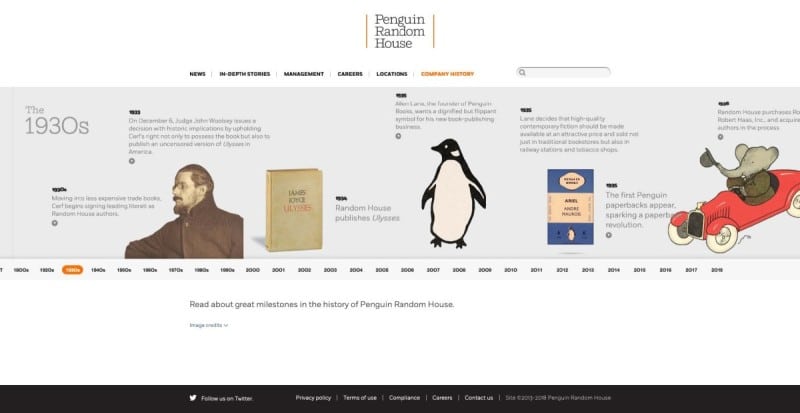
Screenshot from Penguin Random House Company History timeline for the 1930s.
A more truthful history came to light in 1998 after the company’s then-chairman, Thomas Middelhoff, asserted during a speech in New York “that the company had been shut down in 1944 because it had published books banned by the Nazis.” This retelling of the Bertelsmann myth was soon discredited by Hersch Fischler, who published articles exposing the company’s Nazi connections. Faced with this public accusation, in late 1998 Bertelsmann appointed independent scholars to investigate discrepancies in the company’s account of its wartime history, resulting in a 794-page report published in 2000. In 2002, the chairman of Bertelsmann, Gunter Thielen, said, ”I would like to express our sincere regret for the inaccuracies the commission has uncovered in our previous corporate history of the World War II era, as well as for the wartime activities that have been brought to light.” He stopped short of an apology.
As the New York Times reported, “The scholars found no evidence of Heinrich Mohn’s attitudes toward Jews one way or the other.” “Above all else,” the report says, ”during the Third Reich, Bertelsmann remained a business enterprise whose publishing decisions were based on turnover, profit, investments and other fiscal data.”
This conclusion should come as no real surprise, but is perhaps the most important part of the report. Not all of the Big Five publishers can be shown to have profited from literally supporting Nazism as PRH’s parent company did, but all the Big Five are currently profiting from misogyny, white supremacy, and fascism. After all, above all else, they are business enterprises whose publishing decisions are based on turnover, profit, investments, and other fiscal data.
Publishing in support of the far right: the present
Around 2002, seeing a market that they hadn’t yet tapped, and inspired by the success of Conservative publisher Regnery, the top four of the Big Five began to aggressively court the Fox News market. Between 2002 and 2010, each set up a dedicated conservative imprint.
In 2002, Random House set up Crown Forum (now just Forum) “as a way to inform and contribute to the national dialogue and political discourse. It is now one of the leading publishers of politically conservative authors and points of view.” Their authors include Neil Gorsuch, Antonin Scalia, Charles Krauthammer, Jonah Goldberg, George Will, and Mary Katharine Ham.

Screenshot from Forum books website.
Penguin set up Sentinel in 2003, which they describe as, “a dedicated conservative imprint within Penguin Group [that] publishes a wide variety of right-of-center books on subjects like politics, history, public policy, culture, religion, and international relations. The name Sentinel symbolizes a tough-minded defense of America’s fundamental values and national interests.” Their authors include Mike Huckabee, Marco Rubio, Ben Carson, Donald Rumsfeld, Nikki Haley, Ann Coulter, and Fox & Friends’ Brian Kilmeade.
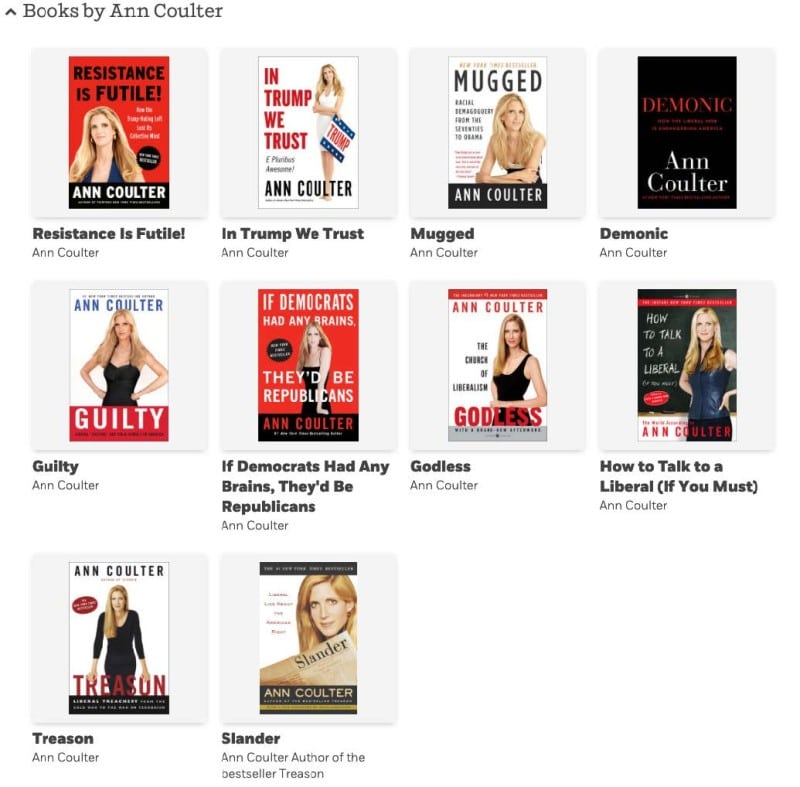
Screenshot from Penguin Random House website of books by Ann Coulter.
Similarly, in 2004 Hachette set up Center Street, whose authors include Donald Trump Jr., Pete Hegseth, Jeanine Pirro, Newt Gingrich, Vivek Ramaswamy, and Kristi Noem.

Screenshot from Center Street website.
In 2005 Simon & Schuster set up Threshold, whose mission statement says, “Threshold is proud to have published some of the most influential and controversial political leaders of our time”— listing, among others, Dick Cheney, Donald Trump, Karl Rove, and John Bolton—and “some of the most exciting and controversial broadcasters in media today”—including Rush Limbaugh, Glenn Beck, Sean Hannity, Laura Ingraham, and Alex Marlow, editor-in-chief of Breitbart News Network. More than fifty of their right-wing titles have been New York Times bestsellers, more than twenty of those have been #1 New York Times bestsellers, and several of them have sold over one million copies each.

Screenshot from Simon and Schuster website of three Alex Marlow covers.
In 2010 HarperCollins started Broadside Books, which “specializes in conservative nonfiction, spanning the full range of right-of-center thought and opinion,” and includes authors Peggy Noonan, Ron DeSantis, Harris Faulkner, Christopher Rufo, Peter Schweizer, Donald Rumsfeld, Tomi Lahren, Pete Hegseth, Joe Concha, Jared Kushner, Vivek Ramaswamy, and Sarah Palin. In 2011, they published five short manifestos in a series called “Voices of the Tea Party,” including Community Organizing for Conservatives: A Manifesto for Localism in the Tea Party Movement, which is billed as providing “best practices for local tea party groups” and a focus “on the necessity of local groups to truly affect lasting change in America.” In 2020 the Fox News Books brand was added to the Broadside imprint.
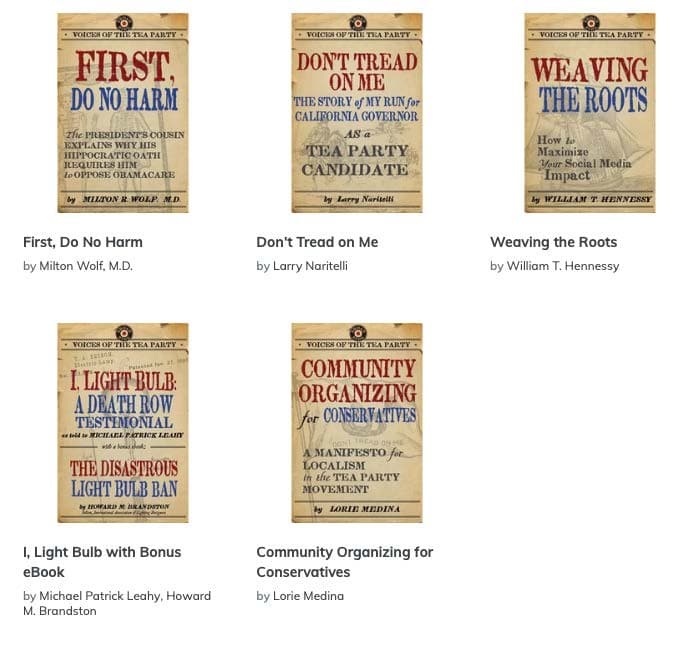
Screenshot of Broadside Books’s Voices of the Tea Party series.
These imprints publish the kind of dog-whistle punditry most popular with the American Right. As the founding executive director of Broadside Books put it, they publish books by authors like Ann Coulter and Sean Hannity “whose aim is to whip the Republican base into a froth, and get rich in the process.” Each of the Big Five operate a part of what the New York Times’ Jim Rutenberg calls “the Incitement Industry.”
Hidden in Plain Sight
Conservatives sometimes complain that these right-wing imprints are meant to ghettoize their books, carving them off from the mainstream brands of big publishing houses that prefer to portray a more liberal image. And there is much truth in this accusation. Big Book doesn’t want most of us to associate them with Rush Limbaugh, Ann Coulter, and Donald Jr. They want us to feel warm and fuzzy about their books, with nostalgic feelings for the classic novels and children’s books they’ve published, like The Grapes of Wrath and Winnie the Pooh.
They don’t want their bestselling white-supremacist, misogynist, borderline hate literature to spoil all that. And it works. The prestige they have built as companies with a long history tied to great literature makes them respectable. That little penguin logo, like a book publishing version of Disney mouse ears, makes PRH seem familiar and cozy.
They work hard to make us believe they are progressive companies because they’ve published Ta-Nehisi Coates and Jessica Valenti. When PRH published Extinction Rebellion’s handbook, This is Not a Drill, they even added a cute little dead penguin on the cover and announced that it would be printed at a carbon-neutral paper mill that plants two trees for every one it uses. And then we don’t pay attention to what they are up to over there on the other side of their businesses.
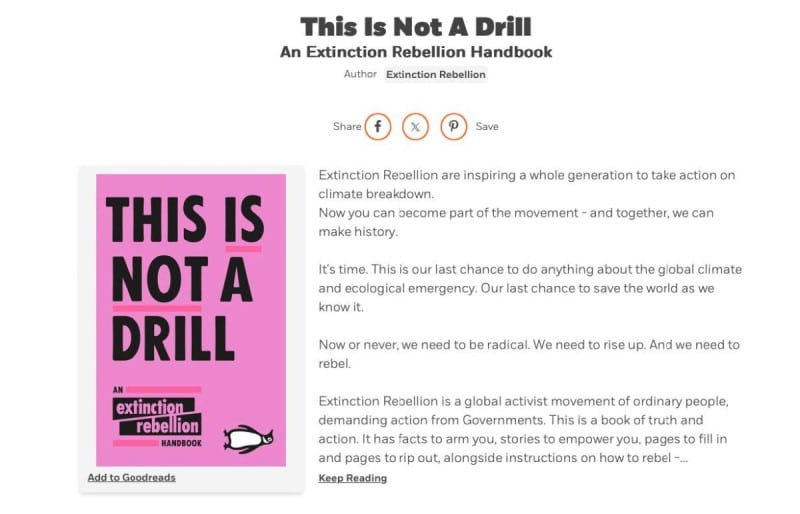
Screenshot of Penguin Random House webpage for This Is Not A Drill: An Extinction Rebellion Handbook.
Big Book will publish authors from the Left as long as they think the books will make them money. Last year, PRH and its imprints published Heather Cox Richardson’s Democracy Awakening and Bernie Sanders’s It’s OK to Be Angry About Capitalism. They’ve published titles like Unladylike: A Field Guide to Smashing the Patriarchy and Claiming Your Space; Road Map for Revolutionaries: Resistance, Activism, and Advocacy; and an activist kids’ book called Steal This Country: A Handbook for Resistance, Persistence, and Fixing Almost Everything.
Big Book sets up charities and scholarships and makes bold claims about its climate impact. Included in the “great milestones” highlighted on the Penguin Random House website for 2021—a year in which corporations rushed to declare that they too believed that Black Lives Matter—are the publication of Amanda Gorman’s poems and new funds to support Black creatives. Great work—but the following year, under their Sentinel imprint, PRH published Don’t Burn This Country: Surviving and Thriving in Our Woke Dystopia: “A guide for anyone who wants to revive the American dream while the woke mob tries to burn down the country.”
Readers—and writers—are mostly fooled by the branding. Books are inherently good, so the companies that make books must be good too, right?
Too Far?
But what happens when these corporations go too far for readers and the progressive authors on their list?
In late 2016, Simon & Schuster’s Threshold imprint did just that by awarding far-right media personality Milo Yiannopoulos a $250,000 contract for his book Dangerous. People expressed their outrage on social media, the Chicago Review of Books and others called for a boycott, and Roxanne Gay pulled her forthcoming book with Simon & Schuster’s TED Books imprint, tweeting, “Milo has every right to say what he wants to say.… He doesn’t have a right to have a book published by a major publisher but he has, in some bizarre twist of fate, been afforded that privilege. So be it. I’m not interested in doing business with a publisher willing to grant him that privilege.”
Gay acknowledged that TED Books and Threshold were different imprints with different staffs and intended audiences, but the link between them through Simon & Schuster was still too much for her. More than a hundred of the publishing house’s authors wrote a letter to CEO Carolyn Reidy requesting the publisher drop the title. Many of them said they didn’t want to be on the same payroll as Yiannopoulos and threatened to leave. After S&S finally cancelled Yiannopoulos’s hate-filled book, right-wing groups predictably protested about the chilling effects on democracy caused by not publishing it. (He later self-published.)
But Yiannopoulos’s book wasn’t cancelled because of his abhorrent politics (after all, the same imprint is the home of books by Rush Limbaugh, Dick Cheney, and Glenn Beck). S&S cancelled the book because of his abhorrent views on sex with minors, which made even right-wingers think twice about hosting him at their events (CPAC cancelled his appearance as keynote speaker). For Simon & Schuster, Yiannopoulos’s history of xenophobia, misogyny, and hate speech was not the problem. He had long used his platform to promote hateful views, from calling Black Lives Matter a “terrorist organization” to likening feminism to a “cancer.” He outed a transgender woman in 2016 and called for the online harassment of comedian Leslie Jones. But it seems he’d finally gone too far even for S&S because he’d alienated his base and they could no longer see a way to make a profit.
As Gay said:
When his comments about pedophilia/pederasty came to light, Simon & Schuster realized it would cost them more money to do business with Milo than he could earn for them. They did not finally “do the right thing” and now we know where their threshold, pun intended, lies. They were fine with his racist and xenophobic and sexist ideologies. They were fine with his transphobia, anti-Semitism and Islamophobia. They were fine with how he encourages his followers to harass women and people of color and transgender people online. Let me assure you, as someone who endured a bit of that harassment, it is breathtaking in its scope, intensity, and cruelty but hey, we must protect the freedom of speech.
Kudos to Roxanne Gay for taking a principled stand. But this was Gay’s TED book. Most of her bestselling books are published by HarperCollins. The same HarperCollins owned by Rupert Murdoch’s NewsCorp. The same HarperCollins that publishes Sean Hannity, Tomi Lahren, Pete Hegseth, Jared Kushner, and Sarah Palin.
Since then, there have been several other high-profile examples of publishing staff, authors, and readers speaking out about specific editorial decisions of the Big Five, in some cases leading publishers to change course but in others not.
In 2020, a year that also saw publishing industry staff protests about lack of diversity and low pay, Hachette workers staged a walkout after learning of the publisher’s plans to publish Woody Allen’s memoir. After additional protests from Ronan Farrow and Dylan Farrow, along with online solidarity from the unionized staff at HarperCollins, the company cancelled the contract and the author had to find another publisher.
Later that year, Penguin Random House Canada’s staff confronted management about their decision to publish Jordan Peterson’s Beyond Order: 12 More Rules for Life. The company held a town hall, where junior staff objected to supporting “an icon of white supremacy” and some tearfully described the negative effects of Peterson on their lives. PRH released a statement thanking the staff for their feedback and went ahead with publishing.
Following the January 6, 2021, attack on the U.S. Capitol, Simon & Schuster cancelled an upcoming book by Senator Josh Hawley. “We did not come to this decision lightly,” the statement on their website reads, “As a publisher it will always be our mission to amplify a variety of voices and viewpoints: at the same time we take seriously our larger public responsibility as citizens, and cannot support Senator Hawley after his role in what became a dangerous threat to our democracy and freedom.”
In April 2021, more than 200 Simon and Schuster employees and 3,500 supporters submitted a petition to the company demanding that it stop making deals with authors tied to Donald Trump’s administration and cancel the multimillion-dollar deal for Mike Pence’s forthcoming memoir. “When S&S chose to sign Mike Pence,” the petition argued, “we broke the public’s trust in our editorial process, and blatantly contradicted previous public claims in support of Black and other lives made vulnerable by structural oppression.” Unmoved, S&S published Pence’s book in January 2024, followed in September by Vivek Ramaswamy’s Truths: The Future of America First and in October by Kellyanne Conway’s memoir, which has sold more than 800,000 copies. It’s worth noting that S&S also distributes Post Hill Press, which has eleven imprints, including several that publish far-right titles and one dedicated solely to publishing rabidly right-wing Zionist books.
In short, despite what appeared to be a moment of hesitation about publishing such material after the January 6 attack, conservative imprints at the Big Five continue to publish blockbuster right-wing books. HarperCollins’ Fox News Books, for example, claims to have sold more than 2.5 million books since its 2020 launch.
It remains to be seen how the Big Five will respond to the Trump gang’s takeover of U.S. democracy and whether what’s been described by many as a fascist coup will be too much even for them. It seems unlikely they’ll suddenly find a moral backbone, especially given that last year Publishers for Palestine exposed MacMillan and Penguin Random House’s ties to Israel, including massive investments by their parent companies in Israeli AI, surveillance, and security technologies, making the companies complicit in the Gaza genocide.
And, in fact, just two days after the recent U.S. election, Hachette announced the launch of a new U.S. conservative imprint, Basic Liberty, led by Thomas Spence, former president of conservative publisher Regnery and a visiting fellow at the Heritage Foundation, the right-wing think tank that coordinated the Project 2025 initiative. Despite a protest by Hachette staff, which led some to quit their jobs, the company shows no signs of changing its plans for the imprint.
This is why simply protesting particular books or choosing the “right” corporate publisher doesn’t work. It’s time we shun them all—as writers and as readers—so that the books we write and read to help us do the work of tearing down white supremacy, patriarchy, fascism, and capitalism are not made by the same people who are also profiting from propping these systems up.
We need to add “Fuck Penguin Random House, Fuck HarperCollins, Fuck Simon & Schuster, Fuck Hachette” to the standard lefty list.
Fuck Big Book.

